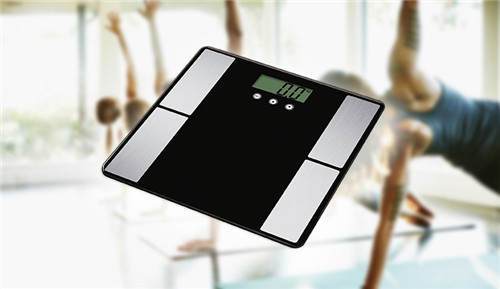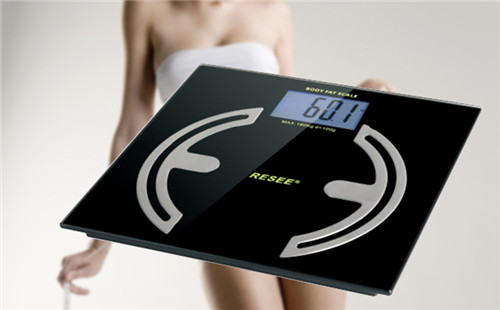Standing on the body fat scale, you find that your weight is going up step by step?
According to the research report, overweight people are more and more inclined to lose weight and maintain weight. But can a body fat scale provide additional advantages for measuring body fat?
Shenzhen Body Fat Scale Wholesale Factory has a variety of models to choose from. When a body fat scale uses a technology called bioelectrical impedance to estimate your body fat content, when you step on the sensor on the body fat scale, an imperceptible current passes up through the pelvis from one leg and down through the other leg. Because it contains more water and muscles can transmit electricity better than fat, the more resistant you are, the more fat you have in your body.The scale uses formulas to calculate body fat percentage from resistance information, as well as other data you enter (height, weight, age, gender). Some also include static electricity to better estimate overall body fat. More and more functions bring strange functions such as wireless data transmission to your computer.
Is the body fat scale accurate enough?
One problem with body fat scales is that they are usually inaccurate. Many variables can affect body fat scale measurements, including the effect of your drinking water, the last time you ate and exercised, and even whether your feet were highly callous or dirty, as well as the type and quality of the product itself. The study found that different body fat scales produce a large number of different readings, which are usually different from the standard fat measurement methods, and hand electrodes are often better equipped. Ten years ago, a study published by Shenzhen body fat scale wholesale manufacturers in fact on obesity.Only foot electrodes underestimate body fat in people with high body fat content, and overestimate it in thinner people. Even the body fat scale manual says that these devices may not be suitable for the elderly, well-trained athletes, children and osteoporosis patients. Consumer reports no longer test body fat scales because they are inaccurate.

Do you really need them?
Whether you need to know your body fat first is debatable. Indeed, weight can be deceptive, because it does not indicate how much fat is and how much muscle is. But there is no widely accepted ideal body fat standard; it depends on age, gender, health and race. Some experts believe that the "health" of middle-aged women ranges from 23% to 33%, 11% to 21% for middle-aged men, 35% for older women and 24% for older men. Athletes usually have much less body fat.
What's more important than body fat is where fat is distributed - body fat quality doesn't tell you that. Abdominal excess fat (such as apple-shaped body) is associated with cardiovascular disease, diabetes and some cancers, while thigh and buttock fat (pear-shaped body) is not a health problem, and may even be protective. In a study on obesity conducted by Shenzhen Body Fat Scale Wholesale Manufacturer in 2009, the readings of the two body fat scales were only slightly correlated with obesity-related risk factors, such as blood lipids and fasting blood sugar.
On the other hand, some researchers say that body fat scales can be used to track changes in body fat over time, and they can help motivate some people to lose weight (of course, conventional scales can also do this). Nevertheless, testing your body fat is not something you need to do every day or every week.
Weighing body fat scale
If you want to monitor your weight, any basic bathroom dial or number - providing consistent readings is enough. The more fancy the appearance, the more fashionable the appearance, the higher the price, but not necessarily better performance.
In Shenzhen body fat scale wholesale manufacturers test different models, set the scale on a uniform floor and weigh several times to see if the reading is the same. When you move the weight from side to side, the reading should not change. Keep in mind that many family scales are not very accurate (that is, they may not give you the real weight of a doctor), but consistency is more important for tracking changes.

How often should you call yourself? Once a week is usually enough, but it's a personal choice. Some people are discouraged by fluctuations that occur in a day or a few days. If you do your weight every day, it's an average week. At the same time of the day (a good time when you wake up), weigh yourself in the same (or no) clothes. Focus on changing over time, not just reading alone.
Other options
One of the best ways for people who use body fat scales regularly to know if they have too much dangerous body fat is to simply measure your waist. Considering that body mass index (BMI) is another good measure of weight and height, unless you are muscular.
However, if you want to know your body fat percentage, you can measure it by trained professionals in University institutions, hospitals or sports medicine clinics. The methods used include hydraulic measurements (underwater weighing, considered to be the most accurate), air displacement instead of water and DEXA scans (an X-ray similar to bone mineral density measurements). Body fat can also be assessed with skin folding calipers, but the accuracy of the results depends on the skill of the person who tested it.

How to Measure Waist Circumference by Weight Scale
How do you measure your waist with a weight scale? It sounds simple, but the waist position is not always obvious. Posture and other variables affect reading, so here are some basic guidelines:
Place the tape measure at the narrowest or middle point between the lower rib and the top of the hip. It should be comfortable but not compressed. If you can't find the narrowest point (if you're overweight, it may be difficult), you can measure it above the belly button.
Stand up straight on the body fat scale and exhale normally; don't suck your belly.
Before breakfast, measure your waist before breakfast.
According to the data provided by Shenzhen body fat scale wholesalers, although there is no magical threshold, more than 37 inches for men and 32 inches for women indicate an increased health risk. More than 40 males and 35 females indicated a significant increase in risk.

Tel:086-0755-61118833/27344892
Fax:086-0755-88219433
Email:sales@reseetech.com
URL:www.reseetech.com.cn、www.reseetech.com
Address:Room 1102,Building 22, Shapu Wai Community Entrepreneurship Industrial Zone, Songgang Street, Baoan District, Shenzhen City, CHINA
